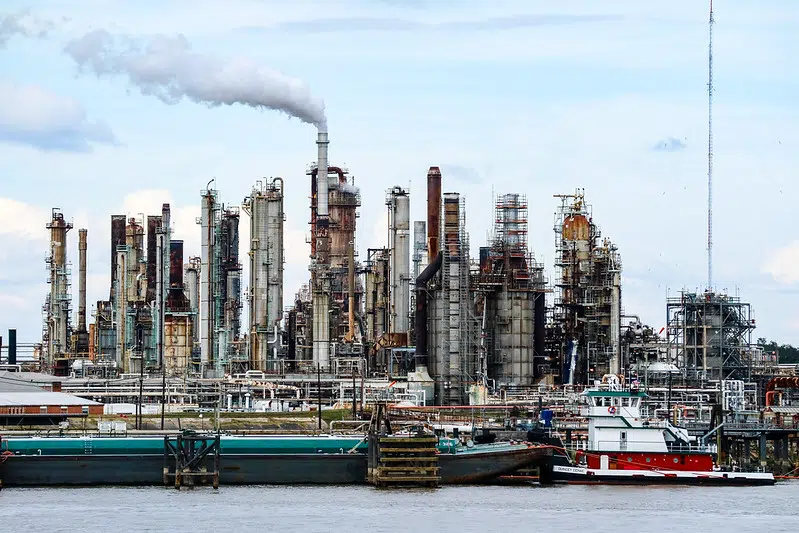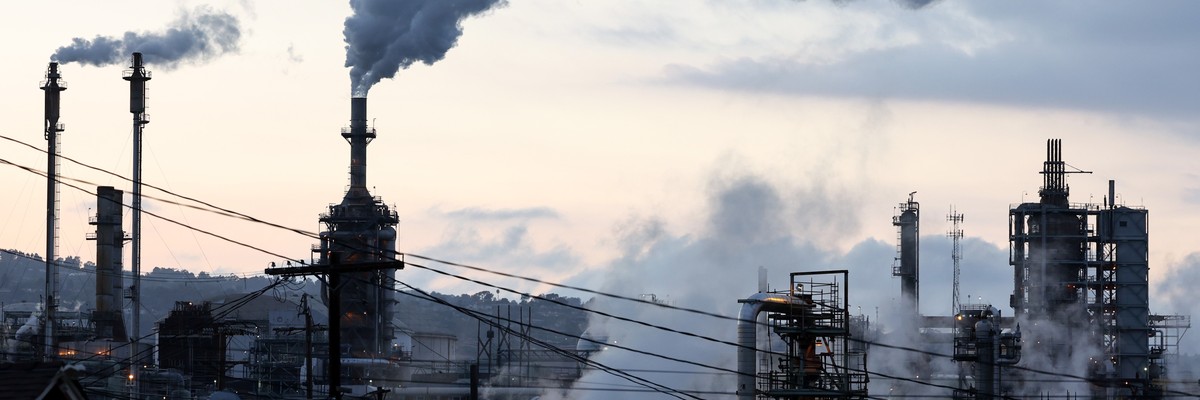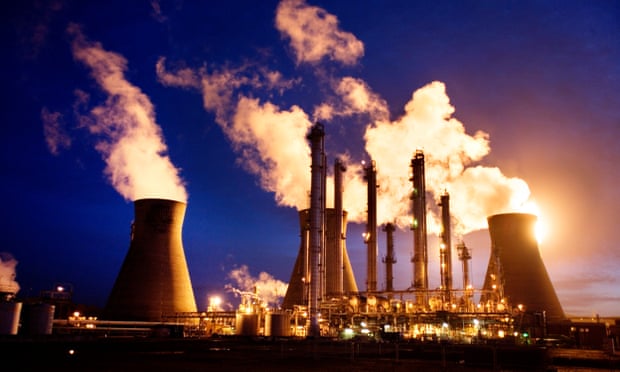Congressional Investigation Reveals New Evidence of Big Oil’s Decades-Long Campaign to Deny Climate Science
Original article by Adam M. Lowenstein republished from DeSmog.

Oil and gas companies and their top trade groups were aware for decades that carbon emissions contribute to climate change, according to a scathing new report from congressional investigators. Moreover, industry giants knew that many of the technologies they presented publicly as solutions to the climate crisis – such as algae-based biofuels and carbon capture and storage (CCS) – were neither as green nor as feasible as they promised, the study reveals.
The Senate Budget Committee and Democrats on the House Committee on Oversight and Accountability published the report and related documents on April 30, three years after launching a joint investigation of Shell, Chevron, BP, ExxonMobil, and two leading industry trade groups..
Fossil fuel obstructionism has evolved “from denial to duplicity,” said Senate Budget Committee Chairman Sheldon Whitehouse (D-RI), in a May 1 congressional hearing based on the report.
Both the hearing and the report capture what Whitehouse described as “climate denial lite,” in which the industry pivots “to pretending it is taking climate change seriously, while secretly undermining its own publicly stated goals.”
The investigation reveals that for ExxonMobil and other leading fossil fuel companies in the report, the perception of taking some sort of action on climate appears to have been as high a priority as actually taking action.
For example, for years, Exxon sought to associate its brand with algae-based biofuels. In a 2019 video, the company claimed these biofuels “would one day power planes, propel ships, and fuel trucks – and cut their emissions in half.”

Between 2009 and 2023, Exxon spent some $175 million on algae-related marketing like this video – almost half as much as the company spent working on the technology. (Exxon and other industry leaders largely stopped funding for algae biofuel research by 2023.)
Even as the company publicly touted algae biofuels as a climate solution, the company knew the technology remained unproven – and, moreover, that Exxon was not investing nearly enough money if it were serious about developing algae as a viable technology.
In an email made public by the committee, an Exxon employee noted that one of the company’s executives had “made comments about us getting too far out there on the original algae ads.”
In an Exxon document released by House investigators with the header “Algae Biofuels Program Talking Points,” the company noted, “ExxonMobil’s analysis has concluded that final development and broad deployment of algae-based biofuels by the company would require future investments of billions of dollars” – orders of magnitude more than the $350 million that Exxon eventually spent.
Repeating Patterns
Congressional investigators identified a similar pattern in industry responses to a 2019 decision by Andrew Wheeler, then the head of the Environmental Protection Agency (EPA) under Donald Trump, to roll back a rule designed to reduce methane emissions.
Internally, BP agreed with Wheeler’s decision. In a 2019 email published by the committee, one executive noted that Wheeler’s “legal theory … for rolling back direct regulation of methane” was “aligned with our thinking.” The American Petroleum Institute (API), the leading trade association for the oil and gas industry, which counts BP as a dues-paying member, lobbied for the rollback.
In public, however, BP and other oil giants claimed to be disappointed by the Trump administration’s decision. David Lawler, then-chairman and president of BP America, said publicly that “direct federal regulation of methane emissions is essential.”
“Time and again, the biggest oil and gas corporations say one thing for the purposes of public consumption, but do something completely different to protect their profits,” Jamie Raskin (D-MD), the top Democrat on the House Oversight Committee and one of the leaders of the investigation, said in his prepared testimony.
“Company officials will admit the terrifying reality of their business model behind closed doors, but say something entirely different, false, and soothing to the public,” Raskin said.
Yet, even as Raskin and Whitehouse were able to reveal damning new evidence of this corporate doublespeak, they pointed out that a complete public reckoning remained impossible, since the industry refused to fully engage with investigators.
Denying Reality
In a pattern that echoes the fossil fuel industry’s decades-long efforts to deny the reality of climate change and, more recently, to portray oil and gas companies as committed to solving the crisis, the four companies and two trade groups that received congressional subpoenas appear to have withheld meaningful information while simultaneously flooding the committees with “hundreds of thousands of generic and non-responsive documents,” Raskin said.
Many documents submitted by the API were almost entirely redacted. The U.S. Chamber of Commerce produced only 24 documents that congressional investigators considered within the scope of the subpoena, including an invitation to a virtual meeting about “the future of natural gas infrastructure.”
Fossil fuel interests “completely obstructed the committees’ investigation,” Raskin said in a video played at the hearing.
During the hearing, this disinformation effort was assisted by congressional Republicans.
Sen. Ron Johnson (R-WI) read into the record debunked right-wing claims that carbon dioxide is good for the climate because it is “plant food.”
Source: Senate Budget Committee on X
Sen. John Kennedy (R-LA) spent significant time alleging that Dr. Geoffrey Supran, a University of Miami climate disinformation expert who testified at the hearing, wrote tweets that Supran did not, in fact, write.
“These are not my tweets, these are retweets,” Supran attempted to explain when he was finally shown the tweets, as Kennedy continued to speak over him.
“I’d like to make very clear that this form of character assassination is characteristic of the propaganda techniques of fossil fuel interests,” Supran added.
Supran’s point, however, was mostly obscured by Kennedy’s ongoing hectoring from the committee dais.
In a more productive exchange, Sen. Tim Kaine (D-VA) asked Raskin about the argument Exxon put forth that the investigators’ subpoena was “designed to intrude on ExxonMobil’s First Amendment activities, including its constitutionally protected right to petition the government.”
“That would obviously lead to the end of our civil and criminal discovery system, if the first amendment gave you the right not to turn over documents,” Raskin, a former constitutional law professor, replied.
“When an objection is made – if it is an extremely unpersuasive, novel, imaginative, unsupported objection – you can always tell, there’s something they really don’t want you to see,” Kaine noted. “I can only imagine the extent of the iceberg under the water that you were not allowed to see.”
The fossil fuel industry’s refusal to respond adequately to congressional subpoenas, while also flooding the committee with what Raskin’s testimony called a “paper blizzard” of some 125,000 “mass emails, newsletters, flyers, and otherwise meaningless fluff documents,” appeared designed to distract investigators and forestall potential legal action against companies and their executives.
“There is certainly an adequate legal foundation for litigation against this industry,” Sharon Eubanks, the former head of the tobacco litigation team at the Department of Justice, and leader of the U.S. government’s racketeering case against Big Tobacco, told members of the committee.
“Both industries lied to the public and regulators about what they knew about the harms of their products, and when they knew it.”
Original article by Adam M. Lowenstein republished from DeSmog.



